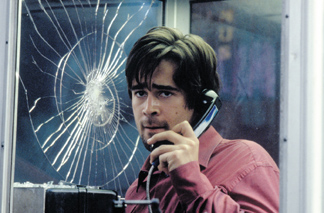Clear Connection
Colin Farrell gets put on hold for 80 minutes
By Matt Mulcahey

Let’s hope he’s using that phone to make a booty call to Britney Spears.
Whatever mid-life crisis or attack of artistic conscience that made studio hatchetman Joel Schumacher turn to smaller, more personal films like Flawless and Tigerland has apparently passed. Following last year's by-the-numbers Jerry Bruckheimer bomb Bad Company, Schumacher takes an idea full of promise and possibility and, despite a 12-day shooting schedule and limited budget, turns it into a slick, conventional, extended cliché. In the end, the movie is nothing more than Speed in a film phone booth.
Based on a long-gestating script by Larry Cohen (a genre filmmaker who specialized in 70s exploitation fare like It's Alive and Hell up in Harlem), Phone Booth fails to create any tension despite the claustrophobic setting and abbreviated running time. In fact, the movie's most effective moments come before the titular location even enters the frame. As a ruthlessly ambitious publicist, Colin Farrell (sporting a vague New York City accent and a bad goatee) strolls along the streets of Times Square manning a pair of cell phones and barking orders at his assistant who he doesn't pay.
The brief scene perfectly and quickly establishes Farrell's character: He is conniving, morally deficient, and a born liar. Stopping at a phone booth in the sleaziest part of the cleaned-up, tourist friendly Times Square (the last phone booth in New York City, according to the unnecessary prologue voice-over), the married Farrell makes his daily call to an aspiring actress (Katie Holmes), a client he's been trying to bed. She again denies him, but as Farrell hangs up the receiver the phone rings back and he finds himself in battle for his life when the self-righteous sniper (Keifer Sutherland) on the other end promises to shoot him if he leaves the booth, tells anyone who he's talking to, or fails to comply with any given order. The set-up has all the makings of a suspense classic, with its confined space, flawed hero, and real-time narrative. But what begins as a psychological battle of wits, a box drama pitting a slick con man against a crazed gunman who, above all things, hates phoniness, gives way to a tired variation on a well-worn plot as the police arrive in full force and add a hostage negotiation subplot.
Farrell is merely adequate in the lead and, despite already being anointed as the next movie star (and possibly heir apparent to the aging Tom Cruise's throne), other than an intense role in Minority Report, the Irish actor has yet to fulfill the promise of his iconoclastic turn as a Vietnam boot camp soldier in Tigerland.
While completely wasting Holmes and High Art's Radha Mitchell (playing Farrell's wife) in thankless roles and making the normally dependable Forrest Whitaker (as head police negotiator) look as bad as he ever has, Phone Booth's lone bit of effective characterization comes from Sutherland. Long a favorite of Schumacher's, having appeared in the director's The Lost Boys, Flatliners, and A Time to Kill, the eternally-underrated actor's creepy voice-over narration is the one thing that makes the film occasionally taut.
It's almost as if Schumacher sets out to diffuse the movie's tense premise. Instead of leaving the camera to unobtrusively record the intriguing conversation between hostage and wrathful triggerman, Schumacher constructs the film in the post-Michael Bay pattern of quick-cuts and excessive close-ups as his shot selection constantly distracts with its invasiveness. Which is what, in the end, destroys Phone Booth: The movie simply has the wrong director. The premise is Hitchcock's wet dream (and he dealt with the elements of real time and a confined setter infinitely better in Rope and Rear Window, respectively), but Schumacher merely transforms tense into tepid.
Despite his recent pretensions toward indie credibility, Schumacher is nothing more than a proficient studio journeyman who specializes in gloss and artifice, which is exactly what Phone Booth didn't need.
HOME | THIS ISSUE | ACE ARCHIVES